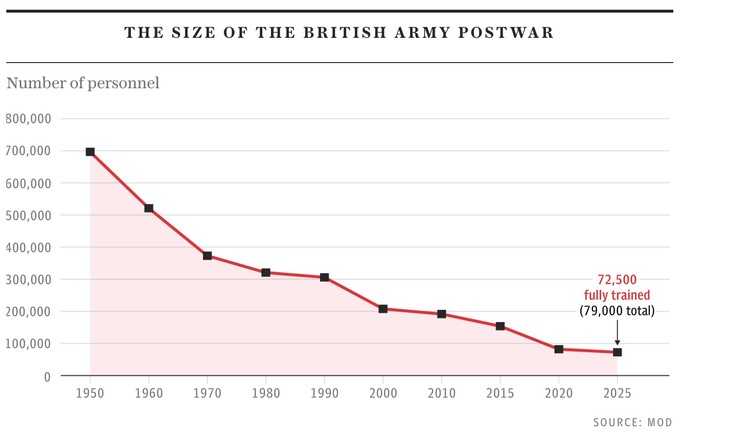Nobody in their right mind thinks that the UK’s army should be staffed at the same level as at the height of the Cold War.
But with all the talk about a potentially imminent conflict between Russia and NATO, or worries about a conflict with China that could rope in the Brits, it seems a bit odd that the UK is reducing its army’s size yet again, to a level 1/10th that of 1950.
It’s a pretty stunning move, cutting the army’s size by 10% to a level that hasn’t been seen since Napoleon’s time. There is no “right” size for a military–you want just enough to deter your enemies or defeat them if necessary and not so much that it presents too great a burden on the rest of the economy. Achieving that balance is a matter of guesswork, prudent judgment, and political will.
Grant Shapps defends cuts to troop numbers because soldiers have a "can-do" attitude: https://t.co/9KfUqtdH2f
— Danielle Sheridan (@SheridanDani) January 16, 2024
Generally speaking, though, one doesn’t shrink the size of the military, deplete ammunition reserves, send equipment to allies in order to get destroyed, and expect one’s deterrent and military power to remain the same.
And, however well-trained and whatever the level of morale, a “can-do” attitude can’t replace raw military power, no matter what a politician says. Technology, training, logistics, and great C4/ISR (Command, Control, Communications, Computers, Intelligence, Surveillance, and Reconnaissance–an ever-expanding acronym) can do a lot, but you need people and munitions to win wars.
Not according to the UK’s Defence Secretary:
Grant Shapps has defended cuts to troop numbers as he said soldiers have a “can-do” attitude.
The Defence Secretary insisted the British Army remained capable of being deployed at short notice and fulfilling its role of defending the nation, regardless of its dwindling numbers.
In 2021, the Ministry of Defence announced it would cut troop numbers from 82,000 to 73,000 by 2025, its smallest size since the Napoleonic era.
In a speech at Lancaster House on Monday, where Mr Shapps set out his future vision for the defence of the UK and its allies, he said: “I often find, actually, especially just having conversations about the military, what people confuse and conflate are the precise number of troops, specifically for the Army, with how well you are defended as a nation.”
Mr Shapps added: “There are so many different elements to our deterrent and to our military assets which go way beyond just pure numbers.
“I find our military is incredibly capable. They are very much ‘can-do’ in attitude. We are getting the funding that they need to do the job.”
The US has shown that modern Western militaries can accomplish wonders with modest troop numbers deployed. But then again, we have the best Air Force in the world and, until recently, a nice stockpile of munitions–and adversaries that were not exactly near-peer. If Britain needs to deploy its army it will be fighting a capable military with massive resources, although likely an inferior one in quality.
But quantity has a quality all its own. In fact, the American way of war until the post-Vietnam reforms was based on mass production and attrition more often than not.

However, Lord Dannatt, the former head of the Army, told the Telegraph that while there was “no doubt” serving personnel had a “can-do” attitude, it did not make up for the fact “the British Army has never been smaller”.
“The bottom line is numbers do matter,” he said.
“It is a fact that at 73,000 the British Army has never been smaller and the Government has to accept there is a risk having an army that small. What happens in future if British forces are committed on the ground, can we sustain the operation for six months to 18 months?”
Mr Shapps added that in the five months since having been made Defence Secretary, there had not been a “single deployment” he was not able to supply British personnel for when asked by Nato.
Well then, look back five months and no disaster yet. How comforting to the British people.
✍️ "Britain’s pathetic defence spending is a repeat of 1930s mistakes", writes Richard Dannatt https://t.co/RFBWCcOfvl
— The Telegraph (@Telegraph) January 5, 2024
Handing unlimited resources to a military-industrial complex is a mistake that Great Britain is certainly not making; instead, they seem to share the complacency of Germany, which barely has a military at all anymore. Unless the end of history has actually arrived–a proposition for which the evidence isn’t even thin, but nonexistent–a big price will be paid for that complacency.
When David Cameron took office in 2010, his new chief secretary to the Treasury found the shocking note from his Labour predecessor telling him that there was no money, and Liam Fox realised he had inherited a £35 billion black hole in the Defence budget. The ensuing Defence Review of 2010 decided to solve the problem by taking risk: the starkest illustration was taking the entire Harrier aircraft fleet out of service years before their planned replacement would be ready.
Today’s lead story in this newspaper (“Navy has so few sailors ships must be scrapped”) prompts an inevitable sense of déjà vu. Decommissioning HMS Westminster and HMS Argyll this year, at least four years before their successors HMS Glasgow and HMS Cardiff can join the fleet, is surely history repeating itself.
Defence risks must be weighed up in the context of current world affairs. The spill over from the Israel-Hamas conflict has now had a major impact on international shipping routes and world trade, which will inevitably exacerbate the cost-of-living crisis through rising prices here. As an island nation dependent on the sea lanes of the world for imports and exports, there is a very strong case for the Royal Navy to be able to play a full part in preserving our trade lifelines.
In the old days, mobilizing a country for war was expensive and took a while, but these days it is almost impossible to do on a reasonable time scale while maintaining the advantages the West relies on. Draft armies will be poorly trained, and rapidly produced weapons will not have the technological edge that our strategies and tactics rely on.
Is Britain in trouble at this very moment? It seems unlikely. But it is setting itself up for trouble, and the warning signs are there for all of Europe. Germany’s military is truly pathetic, not only because its vaunted tanks are few in number but because they are not performing well in Ukraine either. Until recently, nobody cared.
They had better start caring, because the era of peace in Europe may be ending. If it weren’t for Poland, which is arguably the most powerful military west of Russia, I would worry more about Europe.
The US isn’t doing much better, although our starting point is much stronger than Europe’s. We are understaffed, under-resourced, and overstretched in responsibilities.
If the West wants to set the rules of the international order, it needs to be strong. If we want to retreat, that is an option. We will be poorer, but less in need of worrying about world affairs.
But make no mistake, our supply chains are international, so autarchy is not an option in the near future. Our food, our fuel, our pharmaceuticals, our computers and chips, and even our clothes are made overseas. That is possible because we own the seas. We can retreat, but we will pay a price.
Europe seems to be choosing that path.








Join the conversation as a VIP Member